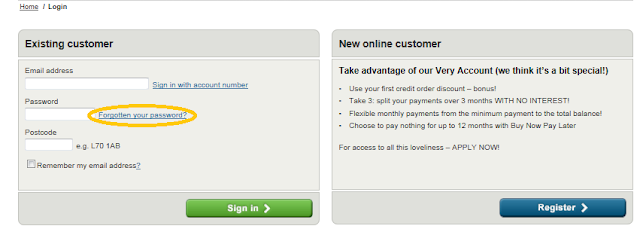How to purchase an item online?
Very is one the UK's online retailer. Their products include clothing, electronics, furniture, homeware and jewellery. Their website allows people to browse and purchase items or online shopping.
- The first step in purchasing an item from Very is to go to their website (www.very.co.uk) and click the 'Sign In/Register' located on the to left side next to their logo on their home page as shown below.
- If you are already a registered customer and you forgot your password, you simply need to click 'Sign In/Register' or 'My Account' and then click 'Forgotten your password' under the 'Existing Customer'. Then you need to enter your email address, date of birth and postcode in order for the company to send you your password to your email address.
- The information needed for registering are shown below:
- Email address and password are needed for registration in order for customers to log in on the
website and purchase items that they want.
- Personal details like name, date of birth, contact number and home address are also needed in order
for the company to identify whether the person registering is a real person and not someone or
something fake that might harm their website.
- There is also a sign on the upper right side of the registration section that says that the website is
secured. This allows the customer to know that the information they are giving are secured.
- After putting all the information needed, the customers need to click continue and must read the Terms and Conditions and Privacy Policy before clicking the 'Agree' button. After agreeing to the website's terms and conditions and policies, the customers are now able to log in and shop to their website.
- If for example customers want to buy a mobile phone, they need to enter how many mobile phone they want to purchase on the 'Quantity' section and they need to choose whether they want insurance on the 'Mobile Phone Insurance' section. After this, they need to click the 'Add to Basket' button and then clicking the 'Go to the Basket' button.
- The shopping basket items, list all the items that customers want to purchase. The customers need to click the 'Continue Securely' button to buy the items they want.
- After this the customers are allowed to choose delivery options they want on the delivery section. The customers can also change and add an address where they want the parcels to be delivered by clicking 'view' or 'Add address' as shown below:
The delivery options are:
- Free Next Day Delivery With Collect+ - the delivery is free but the customers need to collect the parcel to their nearest Collect+ store.
- Standard Next Day Delivery - The delivery costs £3.95 and the parcel will be delivered the very next day when the orders are place before 9pm Monday through Friday. The parcels are delivered directly to cutomers' home address.
- Specified Day - The delivery costs £4.95 and this allows customers to choose date and time of delivery they want their orders to be delivered. The parcels are also delivered directly to the customers' home address.
When customers finally decided what type of delivery they want and the address they want
their orders to be delivered, then they can click 'Continue to payment' button.
- Very customers have different ways to pay their orders: by card, Very credit, phone, bank or building society, PayPoint, post and at the Post Office.





















